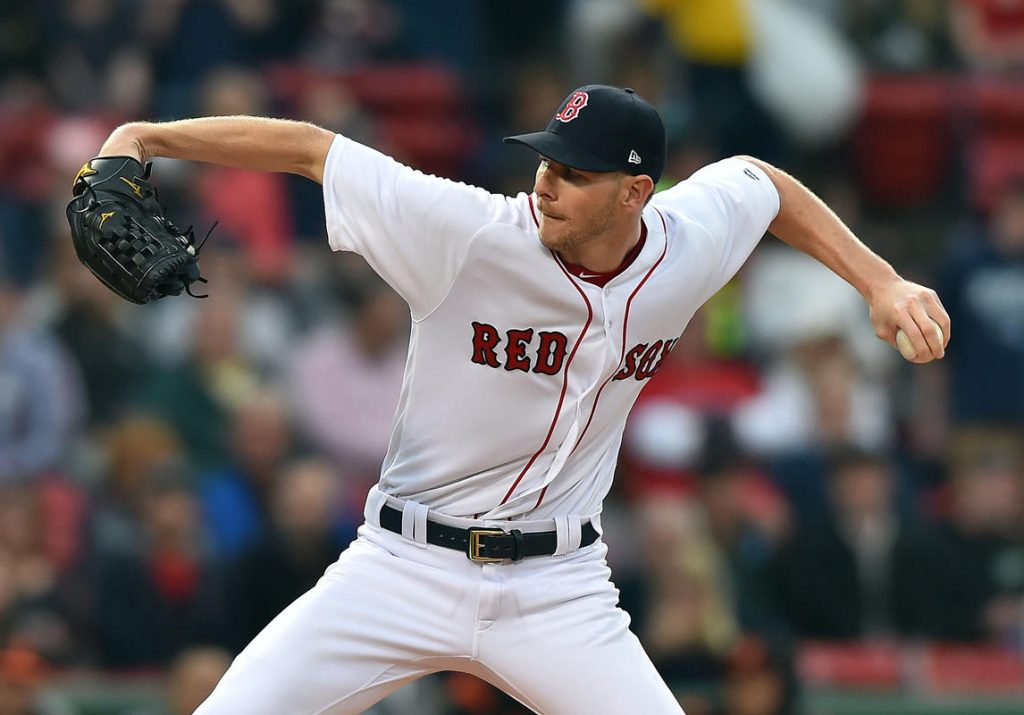Pitching wins championships. It’s that simple. Of course you need hitting, but it pales in comparison to the importance of a strong pitching staff. As we explained (here) and (here) and (here), we at Boston Sports Extra consider pitching kind of important. We’re smart. You should listen to us.
Consider the 2017 Red Sox; punchless at the plate, abysmal on the bases, and among the worst fielding teams in the league. Yet they still won 93 games and the division. That’s only possible because of great pitching. To take the next step and hopefully another World Series, Boston not only needs to add power to the lineup, they need to at least maintain their staff production.
The Rotation
Looking at the next year’s rotation starts with analyzing Boston’s existing contracts. In addition to the realization that Porcello basically makes double Sale’s salary, what stands out is that the Sox are in pretty good shape for starting pitching.
| Name | Age | Contract Status | 2017 | 2018 | 2019 | 2020 |
| David Price | 31 | 7 yrs/$217M | $30M | $30M | $31M (O/O) | $32M |
| Rick Porcello | 28 | 4 yrs/$82.5M | $20.12M | $21.1M | $21.1M | FA |
| Chris Sale | 28 | 5 yrs/$32.5M | $12M | $12.5M (O) | $13.5M (O) | FA |
| Drew Pomeranz | 28 | 1 yr/$4.45M | $4.45M | Arb | FA | |
| Doug Fister | 33 | 1 yr/$1.75M | $1.75M | FA | ||
| Steven Wright | 32 | 1 yr/$594k | $593.5k | Arb | Arb | Arb |
| Eduardo Rodriguez | 24 | 1 yr/$585k | $584.5k | Pre-Arb | Arb | Arb |
It goes without saying that ownership will pick up Sale’s $12.5M team option for 2018. Barring injury, they’ll pick up the $13.5M option for 2019 next year as well. Price, though overpaid for what he’s delivered to date, is locked through 2018 at $30M. He can opt out at the end of next season.
With Sale, Price, and Porcello in the fold, Boston has two starters eligible for arbitration. Teams must submit their offers to arbitration-eligible players by 12 December. If they don’t reach an agreement by 17 January, it goes to the arbitrator.
Drew Pomeranz is going to get paid, either signed long-term before the deadline or short-term through the arbitrator. Ownership cannot let him walk. At just 28-years old, Pomeranz (17-6, 3.32 ERA last year) was as important to Boston’s success last year as the flashier Sale (17-8, 2.90 ERA). MLBTradeRumors.com released their normally accurate arbitration estimates last week (available here) and report that Drew is likely to cost $9.1M. Totally worth it.
Steven Wright and E-Rod are different stories. Both are coming off injuries and neither are guaranteed to be ready by spring training. Boston needs rotation depth, and will have to decide if the cost-benefit analysis makes sense in both their cases. At arbitration, Wright is likely to fetch $1.2M and E-Rod $2.7M (MLBTradeRumors.com). That is not chump change if they’re not healthy enough to contribute.
With Wright and E-Rod’s questionable status, don’t be surprise if we see Fister back on the mound in a Sox uniform. He certainly pitched well enough to be a number five starter in a pinch, at least at times. He also pitched poorly enough that he won’t cost a brick.
Free Agents
This year’s prize free-agent starters are Darvish (31 years old, 10-12 last year, 3.86 ERA), Arrieta (31, 14-10, 3.53), and Lance Lynn (30, 11-8, 3.43). Don’t even think about it. Boston will already have $72.6M locked up in the rotation if they resign Pomeranz for the market estimate.
Sox ownership has said time and again that they will not try to compete with the Yankees in terms of payroll. They require staff depth, not top-of-the-rotation starters, have too many line-up needs to dedicate another $15-25M to another starting pitcher. They are probably going to sit this dance out.
Few Crops on the Farm
Boston’s talent pipeline is pretty thin for starting pitchers. Last year’s first-round pick and potential future staff ace Jason Groome (LHP), is years away. And, while he has great stuff and projects high, he was injured in his first start (lat) and shut down until mid-June. The team shut him down for the year in late August with a forearm injury.
Jaleen Beeks (LHP, PawSox) is probably the most big-league-ready prospect. Beeks has four good pitches but also command issues (3.4 BBs per 9-IPs). He projects more as a relief pitcher than starter.
Mike Shawaryn (RHP, Salem) shows promise as an innings eater, but not top-of-the-rotation starter. Last year’s fifth round pick, he has a devastating slider and racks up K’s by the bushel despite an inconsistent fastball that tops out in the mid-90s.
